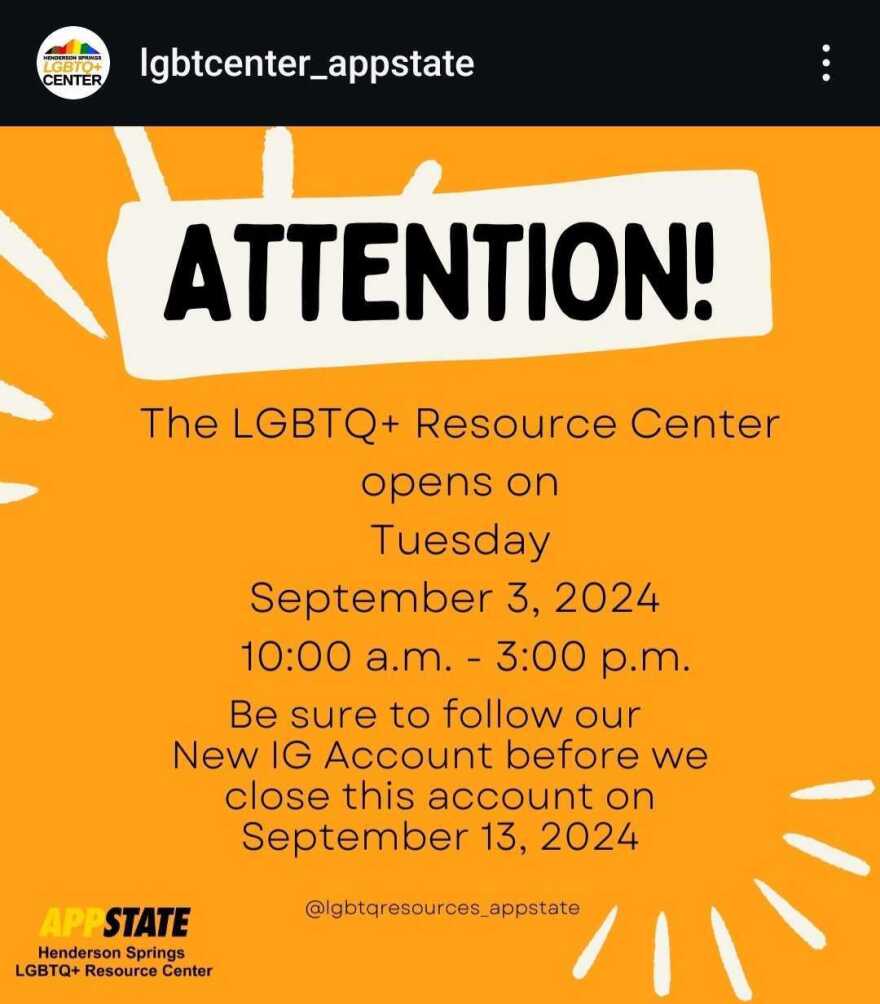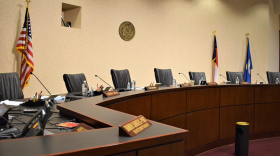Every year, advisers, staff and directors at LGBTQ+ campus centers gather for an annual statewide conference. The North Carolina LGBTQ+ Higher Ed Drive-in was started in 2018 by two center leaders from Duke University and Wake Forest University.
Since then, it has grown to include representatives from several other private universities and most public universities in the state. In 2023, it also added leaders from Virginia, Tennessee and South Carolina.
The event is usually a joyous time to build community and make connections with other LGBTQ+ center leaders across the state.
At this year’s conference in July, attendees told WUNC the mood was much more anxious.
Two months earlier, the UNC Board of Governors had repealed its policy requiring DEI offices, staff, and initiatives at every public university in the state and replaced it with a directive enshrining “institutional neutrality.”
The new policy mandates that campuses avoid “political controversies of the day,” and directs chancellors to make significant changes to DEI offices and jobs.

Austin Horne was an attendee at the LGBTQ+ Drive-in and was hired as the first permanent staff member at North Carolina A&T State University’s LGBTA Resource Center earlier this year.
“The mood was all over the place,” Horne said. “Some of my peers were really afraid about potentially losing their jobs or getting moved to human resources.”
In the past year, policymakers across the U.S. have increasingly passed their own anti-DEI regulations to restrict or eliminate DEI on campuses. According to the Chronicle of Higher Education, over 80 anti-DEI bills have been introduced in the past year.
Several of those bills are now law. In states like Texas and Florida, it is against the law for public universities to spend government funds on any DEI initiatives.
As a result of these laws and policies, many university leaders have closed DEI offices, laid off employees and nixed campus supports like LGBTQ centers.
In North Carolina, the UNC Board of Governors policy change has also shuttered DEI offices. Appalachian State, UNC Charlotte and UNC Wilmington are among the universities that no longer have DEI offices or chief diversity officer positions.
Others have renamed their offices, like East Carolina University’s new Department for People Operations or North Carolina State University’s Office of Equal Opportunity.
University chancellors, however, are tight-lipped about possible staff layoffs. Many have said staff will be or have been relocated to other positions within their universities.
In June, the UNC System’s legal team sent university chancellors guidance for how to apply the policy on their campuses.
It said the UNC System isn’t “categorically” prohibiting centers. However, university administrators must, in some cases, “restructure their content” — including “postings, writings, program content, and other messaging” — to ensure they align with the policy’s “institutional neutrality” standards.
This includes avoiding “content endorsement,” which the UNC System defines as advocating for or against “ideologies, politics, or social commentary.”
Eric Fink is a lawyer and professor at Elon University, a private school in the Triad. He also gave a presentation at the NC LGBTQ+ Higher Ed Drive-in on the BOG’s new policy. It focused on how the policy could impact support and programming for LGBTQ+ students on public university campuses.
Fink said the BOG’s “institutional neutrality” policy is vague and could be interpreted in many different ways.
“There’s a lot of ambiguity or uncertainty about what the policy means and how it is going to be implemented, and the devil is in those details,” Fink said. “And it’s certainly not specific to the LGBTQ+ centers. Any office or function that has gone under the banner of DEI is vulnerable to the same problem.”

At Appalachian State University, officials have already used the policy to change several of its centers.
The LGBTQ+ Center has been renamed to include the word “resources” and is opening with a modified schedule on Sept. 3. The center is also deleting its Instagram page and restarting with an account under the new name.
Administrators have also changed the women’s centers hours, and deleted several webpages that used to be dedicated to its multicultural center.
Nathan Asher, a senior at Appalachian State who used to work at the LGBTQ+ center, said even before the UNC BOG repealed its DEI policy, Appalachian State has been taking away support for LGBTQ+ students.
In April, the university faced backlash after it refused to let students hold a “Pride Week” and instead said they could throw a “Spring Fest.” Asher said several other events the center had planned were also downsized and renamed.
Asher worries the center won’t be able to throw any events after the “institutional neutrality” policy is fully enacted on campus. They also said now that there’s not a DEI office on campus, they worry where students will be able to turn to for trusted help.
“There’s already so many, not even microaggressions, but full-on hate speech on campus,” Asher said. “Students are experiencing hate speech all the time; I have, many of my friends have. Now it’s a little less clear what you’re supposed to do if you’ve experienced something like that.”
When UNC Wilmington Chancellor Aswani Volety closed his university’s DEI office, he said he would also be changing “staffing and programming” of cultural and identity centers. All of the centers have since moved to student affairs.
At UNC Charlotte, which closed its office in August, identity-based trainings are under review. This includes Safe Zone, a program that the university defines as “an umbrella for all educational Queer programming, including the Safe Zone Ally Program and Friendly Peer Training.”
Other universities, like NC A&T, have yet to publicly announce changes to their centers.
WUNC reached out to Appalachian State, NC A&T, UNC Charlotte, and UNC Wilmington for more details on how their DEI changes would impact LGBTQ centers and students. None of the officials offered specifics or agreed to interviews. Several referred to their previous statements or said the plans submitted to UNC System President Peter Hans would include those details. Hans is reviewing those plans before a Board of Governors Meeting in mid-September.
Even if NC A&T’s plans don’t include changes to the school’s center, Horne worries people can still use the policy’s language to target him.
“Here, the Rainbow Room (is) just me — I'm the only person who is an official LGBTA resource center staff member,” Horne said. “And if somebody were to say that I was engaging in one of these prohibited concepts, they could take action against me or the university.”
“Even if I was in the right, the university may lay me off in order to avoid a complicated battle (with the Board of Governors),” Horne continued. “That would be the cheaper and easier option.”
In other states, anti-DEI policies have been used to single out LGBTQ+ staff. Abbie Goldberg is a psychology professor and researcher at Clark University, a private school in Massachusetts. In May, she released a study on the impact of anti-DEI legislation on LGBTQ+ faculty in higher education.

After lawmakers passed anti-DEI legislation in their states, some participants felt surveilled by a watchdog-style group of students, parents, or other faculty members.
“This legislation makes me less confident as a professor,” wrote one anonymous participant in the study. “Scared all the time. Distrusting of students whom I code as threats of reporting me and my lessons to university administration. (This legislation and accompanying fear) interferes with the safe environment I try to create in my classes.”
Goldberg said this constant hypervigilance, or faculty feeling like they always have to be cognizant of how they present themselves, can cause a “chilly campus.”
“They’re going to be much more hesitant to use certain language or call attention to certain themes,” Goldberg said. “Part of the chilling effect is people just not feeling comfortable engaging freely in conversation. It’s really on every level, from the classroom to walking through campus.”
“Chilling effect” is a legal term. The Foundation for Individual Rights and Expression, a group that advocates for free speech on college campuses, defines the term as a phenomenon where people curb their speech or actions in fear of “running afoul” of a law or regulation.
Fink, the law professor from Elon, said chilled speech is most likely to thrive in an environment where there is a lot of ambiguity. Like the vagueness he noted in the BOG’s new “institutional neutrality” policy.
“I’m not here to malign any students, but we know there’s a pattern,” Fink said. “We know there are organized efforts among right-wing interest groups to have students play gotcha with faculty and staff at universities. So, the chilling effect here is very strong, because people who feel like they’re in the spotlight are likely to refrain even from doing things that legally they should be allowed to do.”
In Goldberg’s study, she found that some faculty members responded to anti-DEI legislation by bolstering supports on campus. Some became more active in advocacy and activism, while others added new topics to their courses directly addressing recent legislative changes.

At Appalachian State, Asher is working on reopening the university’s student-run LGBTQ+ group to combat the DEI repeal. He envisions it as a dedicated organization to talk about LGBTQ+ issues and actively interact with other LGBTQ+ people on campus.
“The LGBTQ+ Resource Center is not going to be at all what it used to be. It’s being watched and scrutinized more, and in all likelihood it’s very much not going to be a social space at all,” Asher said. “The big emphasis for me is rebuilding that place, so that students have a community and so that there can be events and learning opportunities.”
Asher feels like students are uniquely positioned to revitalize supports, and is encouraging other students across the UNC System to do the same.
“I’m a senior. If anyone is going to put themselves out there and create new things and maybe face some backlash for it — why not (us)?” Asher said. “Students have to be the driving force behind this change that’s happening.”
At NC A&T, Horne is still worried about how the policy will affect their position. He says he plans to continue organizing events and supporting the HBCU’s student-led LGBTQ+ group PRISM.
“Ultimately, I view this (policy) as something that is intended to put a damper on my activities during an important political period — and I do not want to let that succeed,” Horne said.













